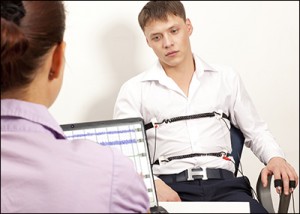Sex Offenders in California Take Lie Detector Tests
By Daniel Stark, Marketing –
California recently began to require paroled sex offenders to take a regular lie detector test intended to assess behavior patterns. The assessment prevents future sex crimes by gauging which offenders are most dangerous and therefore need the greatest supervision. Parolees may be asked a wide variety of questions, including if they participate in a 12-step addiction program, linger in playgrounds, or have inappropriate contact with children.
In the past, only high-risk offenders were required to participate in specifically designed treatment programs. The requirement has been extended to all sex offender parolees. The state is using new “risk assessment” tests to determine individual offenders’ likelihood of future criminal activity. It will inform parole agents which offenders need more supervision than others. Offenders will be required to participate in lie detector tests as a condition of their parole.
California previously used the nation’s largest program tracking sex offenders through GPS devices. Unfortunately, the method has had several tragic failures, including John Garner III, a parolee who murdered two teenagers in San Diego.
Douglas Eckenrod, a parole administrator overseeing the training of parole officers over sex offenders, stated, “These tools, none of them by themselves can absolutely prevent crime. If used together, the tactics can help parole agents prevent crimes while getting offenders the treatment and services they need.”
Harriet Salarno, founder and chairwoman of Crime Victims United of California, said she appreciates the new effort as an improvement to the oversold solution of using the GPS tracking device. However, she does predict sex offenders will find a way to cheat the lie detectors.
Research proves using combined methods have the greatest chance of reducing crimes. Deputy attorney general Janet Neeley noted the combined steps reduce new offenses by 40 percent.
Lie Detector Tests
Michael Risher, the American Civil Liberties Union staff attorney, said lie detectors can be inaccurate. He suggests for polygraph examinations to be exclusive to those the risk assessment deems to be more dangerous.
“It’s a tool that perhaps sets the stage for the first time in an offender’s life where he’s literally practicing being honest,” added Eckenrod.
Among the best potential technological improvements to decrease crime is EyeDetect®. It can be used in place of or in conjunction with standard polygraph tests. EyeDetect will detect deception with a series of simple, non-evasive true or false statements. Answers are recorded with an optical scanner. Deception is detected with 85 percent accuracy. Such lie detection technology can and will prevent future tragedies from occurring.


